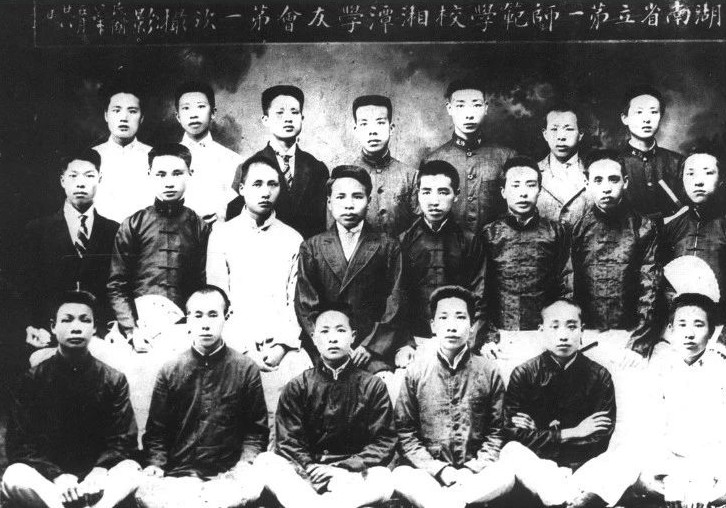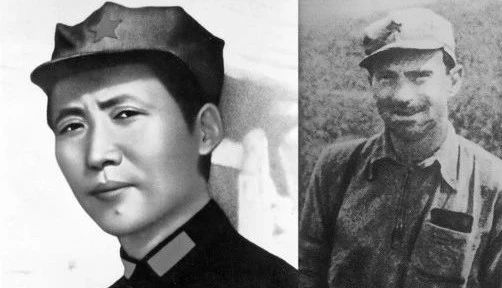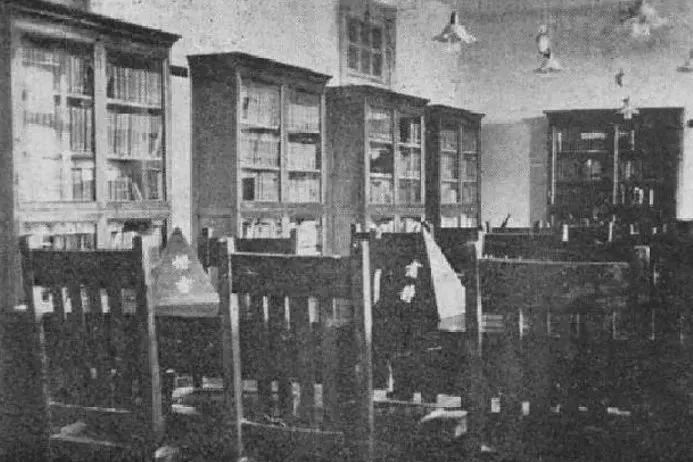
In May, 1919, a group photo was taken by Xiangtan Alumni Association of Hunan First Normal University, with Mao Zedong in the second row and the third from the left.
Author: Liu Yue, deputy inspector of Party History Research Office of Beijing Municipal Committee of the Communist Party of China.
Before the liberation of Beijing, Mao Zedong had only been to Beijing twice before and after the May 4th Movement. During these only two trips to the North, I have to mention his experience of "working" in Peking University Library.
On August 15th, 1918, Mao Zedong, Luo Xuezan, Xiao Zisheng, Zhang Kundi, Luo Zhanglong, Li Weihan and Chen Zanzhou left Hunan for Beijing on the 19th.
I came to Beijing this time to organize young people from Hunan to work and study in France, and also at the invitation of my teacher Yang Changji. The next day, Mao Zedong’s tall and thin figure appeared in the "Bancang Yangyu" at No.9 (now No.15) of the ancient Doufuchi Hutong.
Yang Changji hopes that Mao Zedong will either go to France or stay in Peking University to study for several years, and keep Mao Zedong and Cai Hesen here. Therefore, Mao and Cai temporarily stayed in the single room in the south room of Yangzhai quadrangle next to Xunmen in the southeast corner.
Because the members of Xinmin Society who came to Beijing lived in scattered places, it was inconvenient for them to carry out activities. Soon, Mao Zedong and others rented three rooms at No.7 (now No.8, Zuo Lane, Ji ‘an), a passageway in Sanyanjing Hutong, Jingshan East Street near Peking University at that time, and left the "Bancang Yangyu" in Tofu Pool Hutong.
Beijing "rice" is expensive, and "living in white" is not easy. Mao Zedong needs to find a job and earn some money in Beijing. So he asked Yang Changji for help.
In September, 1918, Li Dazhao, director of Peking University Library, got a temporary job for Mao Zedong in the library, which was introduced by Mr. Yang and recommended in writing by Cai Yuanpei, president of Peking University. He was mainly responsible for managing 15 Chinese and foreign newspapers in the second reading room (newsprint reading room, which is today’s newspaper reading room), registering the names of readers, with a monthly salary of 8 yuan.
For the name of Mao Zedong’s temporary job in Peking University Library at that time, many works have slightly different descriptions.

Mao Zedong (first from left) and Si Nuo
For example, Si Nuo’s "Red Star over China" records that Mao Zedong himself said: "Li Dazhao gave me a job as a library assistant, and the salary was not low, with eight yuan a month."
"Biography of Mao Zedong" compiled by the Central Committee of the Communist Party of China Literature Research Office wrote: "In October, Mao Zedong met Li Dazhao, then the director of Peking University Library, through the introduction of Yang Changji. Li Dazhao arranged for him to be an assistant in the library. "
So, what is the name of Mao Zedong’s temporary job in Peking University Library?
The author believes that it is neither an assistant nor a clerk, but a secretary, based on six reasons.
1. There is no job title of "Assistant"
According to the 1920 National Peking University Staff Record, there is no "assistant" job title not only in the Peking University Library, but also in the whole Peking University institution.
2. Among the four types of staff in Peking University Library, it is more appropriate to say "secretary".
According to the Trial Regulations of the Library Department of the General Affairs Department of Peking University published in Peking University Journal on May 10th, 1920, Peking University Library has four courses: management, reading, book management and bibliography compilation, with two rooms for sending and receiving handouts.
In addition to the director of the library, there are four categories of staff:
Teaching assistant-responsible for collecting books in the library and guiding students to borrow and refer. The staff was appointed from Peking University graduates and was established in September 1920;
Clerk-senior library staff, and the "leading class" of each course is served by the first-class clerk;
Secretary-generally held by newly hired novices;
Handyman-including bookbinder, typist, copywriter, etc.
It can be seen that there was no "assistant" position among the four types of staff at that time. From the above provisions, it can be seen that the post of "teaching assistant" in Peking University Library was set up in September 1920, and Mao Zedong left Peking University in March 1919, so it is impossible to hold the post.
In addition, he has never studied or worked in Peking University before, and it is impossible for him to be a clerk. His work category obviously does not belong to the category of "handyman".
Mao Zedong’s work in Peking University Library and his status as a new recruit are similar to the responsibilities and requirements of the "secretary".
3. Mao Zedong didn’t state that he was an "assistant" at that time.
Mao Zedong mentioned in "Letter to Seven or Eight Uncle’s Parents" on April 28th, 1919 that "my niece works as a clerk in Peking University, Beijing". He himself did not state that he was an "assistant". The post of "secretary" is the most appropriate with "staff".

In 1930, Jiang Menglin was appointed as the president of Peking University, and it was stipulated that one-fifth of the school’s funds should be used as the funds for books and instruments, and at the same time, it was ready to raise funds to build a new library.
4. Memories of Jiang Menglin
Jiang Menglin, acting president of Peking University, said in the article Li Dazhao and Mao Zedong in Memories:
Mao Zedong became a secretary in Peking University Library when I was acting as principal. One day, Li Shouchang (Li Dazhao) came to the principal’s office and said that Mao Zedong had no food. What should I do? I said, why not let him still run a cooperative? He said no, they were all broke. I said, is there anything wrong with the library? Just give him a position. So I picked up a pen and wrote a note: Mao Zedong was appointed as the librarian with a monthly salary of 17 yuan.
Jiang Menglin’s memory is obviously wrong in time. Cai Yuanpei left Peking University after the May 4th Movement in 1919. In July, Jiang Menglin took charge of the affairs of Peking University, and it lasted for two months until the new semester of Peking University started in September.
Mao Zedong worked in Peking University Library from September, 1918 to March, 1919. For about half a year, it was four months after Mao Zedong left Peking University. It was impossible for Mao Zedong to get a position in Peking University. Jiang Menglin’s memory, however, clearly shows that the name of the temporary errand Mao Zedong seeks is "secretary".
5. Memories of Xiao Zisheng
According to Fan, a classmate of Mao Zedong Hunan Provincial First Division and one of the main organizers of Hunan’s work-study program in France, Xiao Zisheng recalled in Mao Zedong and Me:
Because of the difficulties in life, they wrote to ask Cai Yuanpei if he could give his classmates a job of cleaning the classroom. When President Cai learned about this, he had a better idea and wrote a letter to Li Dazhao, the director of Peking University Library: "Mr. Shou Chang’s great advice: If Mao Zedong wants to get a part-time job in this school, please try to place a secretary in the library, who is responsible for sorting books and cleaning rooms, with a monthly salary of eight yuan. Cai Yuanpei today. "
Therefore, Li Dazhao arranged for Mao Zedong to clean the room and arrange books, which was a very simple task.
Xiao Zisheng’s memory also made it clear that the name of the temporary job Mao Zedong sought was "secretary".
6. There are mistakes in understanding and translation of individual nouns.
Cha Mao Zedong was appointed as a "library assistant", which was based on the book Red Star over China written by Hussenot. The book Red Star over China was dictated by Mao Zedong, translated by Huang Hua and written by Si Nuo in English. Therefore, mistakes in the understanding and translation of individual nouns are inevitable.
The word "assistant" in the English version of Red Star over China does mean "assistant, assistant and teaching assistant", and the translator translated it into Chinese literally, which gave rise to the widely spread saying that Mao Zedong was appointed as an "assistant" in Peking University Library.
To sum up, I think the job title of Mao Zedong in Peking University Library should be "secretary".
However, the "secretary" of Mao Zedong’s library at that time was quite different from the "secretary" who is now the main person in charge of political party organizations at all levels.
In ancient Chinese, "book" refers to letters and "notes" refers to notes. In the old days, "secretary" refers to people who are engaged in official document copying, belonging to low-level petty officials at the transaction level and office level.
The person in charge of the working-class political party is called the "secretary", which originated from Marx and Engels. At the beginning of 1846, the "Communist Communication Committee" (later renamed communist party), which was founded in Brussels, called the head of the organization "secretary", which means "public servant".
[Reference]
[1] Edgar Si Nuo: "Red Star over China", life reading and new knowledge Joint Publishing Company Limited, 1979 edition, p. 127.
[2] the Central Committee of the Communist Party of China Literature Research Office: Biography of Mao Zedong, Central Literature Publishing House, 1996, p. 41.
[3] the Central Committee of the Communist Party of China Literature Research Office, Mao Zedong Research Group, Shaoshan Mao Zedong Memorial Hall: "Letters from Mao Zedong to relatives and friends in Shaoshan", Central Literature Publishing House, 1996, p. 5.
[4] Jiang Menglin: "Li Dazhao and Mao Zedong in Memories", in Zhang Jingru’s Chronology of Li Dazhao’s Historical Materials, Shanghai People’s Publishing House, 1984, p. 59.
[5] Ma Yong: Biography of Jiang Menglin, Henan Literature and Art Publishing House, 1999, p. 99.
[6] Xiao Yu: "Mao Zedong and I" abridged translation of the fifth, contained in Taiwan Province’s "Arts and Records" No.20 p.20, May 1967.
This article was published on WeChat WeChat official account: Dongfanghongla (ID: dongfanghongla), please indicate the source.
关于作者